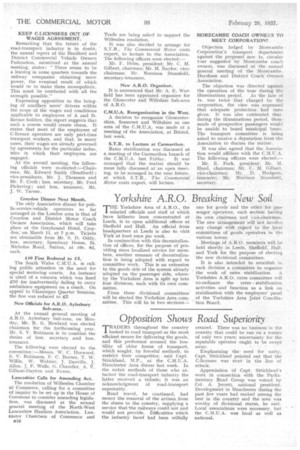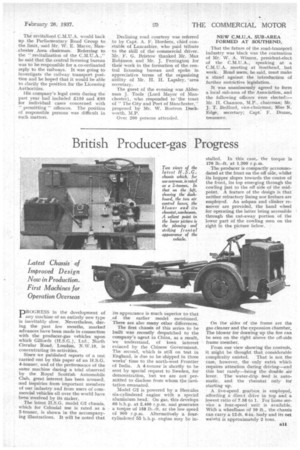Opposition Shows Road Superiority
Page 44

Page 45

If you've noticed an error in this article please click here to report it so we can fix it.
TRADERS throughout the country 1 looked to road transport as the most efficient means for delivering the goods, and this preference aroused the hostility of .older forms of transport, which sought, by forceful methods, to restrict their competitor, said Capt. Strickland, M.P., at the C.M.U.A. Manchester Area dinner last week. In the unfair methods of those who attacked the road-transport in,dustry the latter received a tribute; it was an acknowledgment of road-transport superiority.
Road travel, he continued, had meant the removal of the artisan, from the slums to the country, supplying a service that -the railways could not and would not provide. Difficulties which the industry faced had been wilfully
created. There was no business in the country that could be run on a tenure of only two years; uncertainty for the reputable operator ought te he swept away.
Emphasizing the need for unity, Capt. Strickland pointed out that the C-licensee was next 'in the line of attack.
Appreciation Of Capt. Strickland's work in connection with the Parliamentary Road Group was voiced by Col. A. Jerrett, national president. Development in Manchester during the past few years had ranked among the best in the country and the area 'was worthy of divisional status, he said. Local associations were necessary, but the C.M.U.A. was local as well as national. The revitalized C.M.U.A. would back up the Parliamentary Road Group to the limit, said Mr. W. E. Macve, Manchester Area chairman. Referring to the " revitalization of the C.M.U.A.," he said that the central licensing bureau was to be responsible for a co-ordinated reply to the railways. It was going to investigate the railway transport position and he hoped that it would be able to clarify the position for the Licensing Authorities.
His company's legal costs during the past year had included £150 and £90 for individual cases concerned with " permitting" offences. The position of responsible persons was difficult in slich matters. Declining road courtesy was referred to by Capt. A. F. Hordern, chief constable of Lancashire, who paid tribute to the skill of the commercial driver. Mr. F. G. Bristow thanked Mr. Max Robinson and Mr. J. Ferrington for their work in the formation of the central licensing bureau and spoke in appreciative terms of the organizing ability of Mr. H. H. Lapsley, 'area secretary.
The guest of the evening was Alderman J. Toole (Lord Mayor of Manchester), who responded to the toast of "The City and Port of Manchester," proposed by Mr. W. Rostron Duckworth, M.P.
Over 200 persons attended. NEW C.M.U.A. SUB-AREA FORMED AT SOUTHEND.
That the future of the road-transport industry was black was the contention of Mr. W. A. Willson, president-elect of the C.M.U.A., speaking at a C.M.U.A. meeting at Southend, last week. Road users, he said, must make a stand against the introduction of further restrictive legislation.
It was unanimously agreed to form a local sub-area of the Association, and the following officers were elected:— Mr. H. Channon, M.P., chairman; Mr. J. T. Bedford, vice-chairman; Miss N. Edge, secretary; Capt: F. Donne, treasurer.




























































































